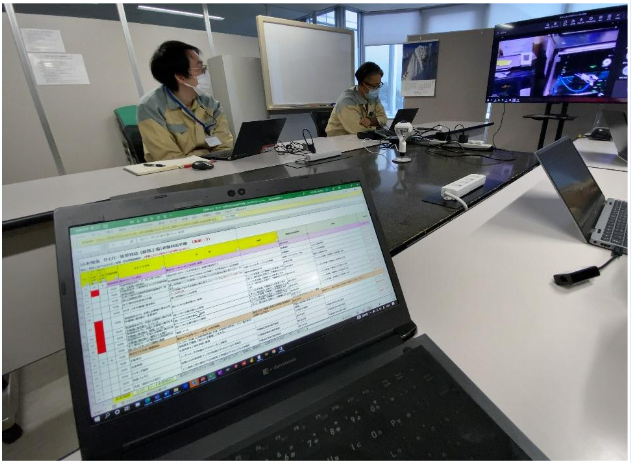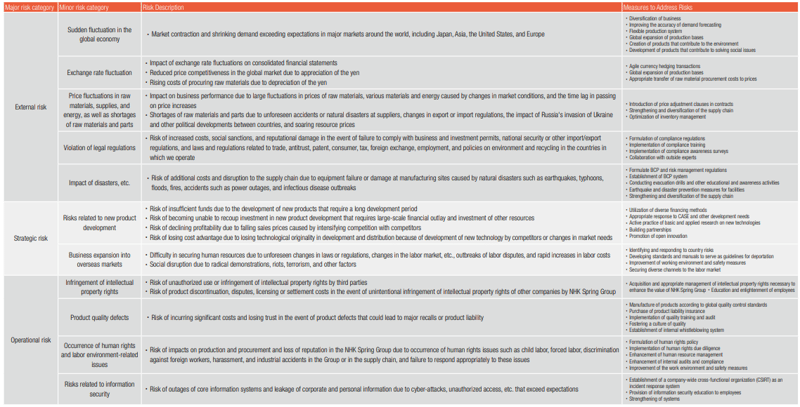Risk Management
Basic Stance
NHK Spring seeks to prevent risks that could affect sound corporate management before they occur, and to minimize losses in the event that such risks materialize.
Risk Management Structure
NHK Spring has built a risk management structure in which the President & COO and Representative Member of the Board acts as the chief responsible officer and the President of the Corporate Planning and Control Division is placed in charge of promotion. We work to prevent risks from arising and minimize damage if risks do occur, and the Sustainability Promotion Committee manages the progress of these efforts.
In addition, in the event where a major risk arises, a report is made immediately to the President & COO and Representative Member of the Board, and countermeasures are taken. A system is in place to report to the Sustainability Promotion Committee an overview of the case, including measures to stop the risk from reoccurring.
Click the image to enlarge.
Establishment and Enhancement of a BCM System
The NHK Spring Group has distributed the "NHK Spring Group BCP Basic Policy" and "NHK Spring Group BCP Guidelines" to all group companies in Japan and overseas, and is promoting the establishment of a Business Continuity Management (BCM) system. If a risk situation occurs, a task force is convened under a leader, and the divisions under its jurisdiction and related divisions work in unison to respond quickly based on the basic policies of "human life first," "responsibility to supply customers," and "fulfillment of social responsibility".
At our Head Office, each plant, and domestic Group companies, we are working to strengthen our initial response and business continuity capabilities by first establishing a disaster prevention system as a platform for formulating a BCP that can respond to various risks. Also, we annually conduct initial response drills assuming the scenario of a large-scale earthquake and BCP drills for quickly restoring and continuing business operations. Based on the reflections from drills, we are also reviewing our disaster prevention system and revising our BCP and various procedure manuals to step up our response system in case of risk occurrence so that we can respond to crises in a more practical manner. In addition, in recent years, overseas Group companies have also been gradually implementing initial response drills and BCP drills based on disaster scenarios according to the conditions in their respective regions.
Also, each plant and domestic Group company conducts an annual self-assessment of its BCM system to identify and improve issues related to disaster prevention, BCP, initial response setup, and BCM promotion, and thereby improve the BCM system.
Ensuring Information Security
Information Security Management Policy
To protect NHK Spring’s information assets and ensure the smooth execution of business operations, we have established an Information Security Management Policy. Based on this policy, we implement appropriate security measures to enhance NHK Spring’s security level and strengthen the trust of our stakeholders.
Information Security and Business Continuity
The NHK Spring Group regards measures to address recently intensifying information security incidents such as cyber-attacks and information leaks as a top priority issue and is implementing a variety of security measures including creation of an information security team, introduction of security software and devices, and security education for employees.
The reason why we have raised the priority level of measures is that the strengthening of information security plays a very important role in ensuring the Company's continuity. We believe that securing a safe and secure foundation prevents or suppresses damage caused by incidents such as information leaks and cyber-attacks and thereby contributes to gaining the trust of customers and other stakeholders, expanding business and strengthening competitiveness.
Moreover, having awareness of cyber-attacks over not only the NHK Spring Group but also the entire supply chain can enable us to avert losses in related industries, secure the Company's continuity and sustain profits.
The NHK Spring Group will continue to leverage IT in the pursuit of business growth and sustainability. At the same time, as we believe that security will play a greater role as risks increase with the advancement of IT utilization, we will continue to strengthen security.
Raising the level of security measures
NHK Spring implements incident response training based on simulations of recent security incidents.
The training primarily consists of checks to ensure that procedures are in place or that incidents can be actually responded to, followed by improvements to identified issues geared to raising the level of the response setup.
Recently, deciding that we still had room for improvement regarding the response speed of our conventional organizational structure, we launched the CSIRT* as a Company-wide organization for realizing rapid and controlled responses. Through conducting cross-departmental measures (activities to coordinate and control between in-company, customers and supply chains) that were difficult to implement with the former vertically split organization, we aim to speed up our response to emergencies.
* CSIRT (Computer Security Incident Response Team) is a dedicated team for responding to security incidents.

